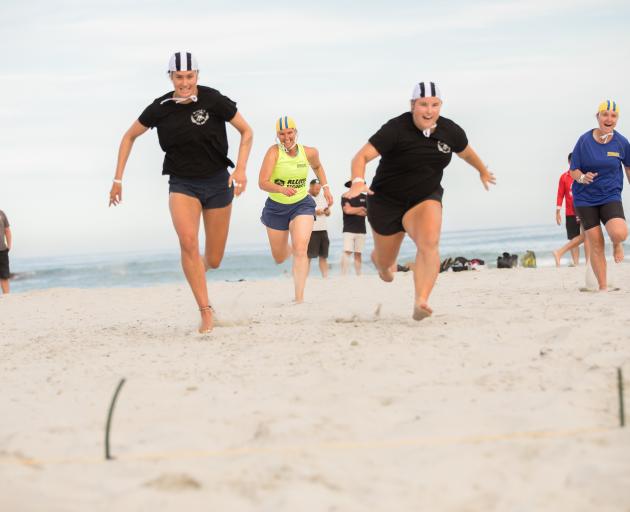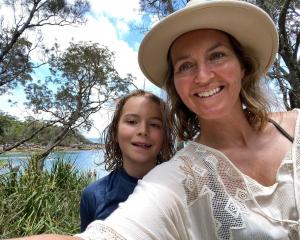

I am now at the tail end of my first season and I warn anyone considering joining, it’s addictive.
What other reason could there be for dragging Fin out of bed at 5.30am on a Saturday and driving for an hour to Waikouaiti Beach to paddle a canoe?
Last week the Otago senior surf lifesaving championships were on. I don’t think I’ve done a sprint race since I was about 8. Even then sprinting was not my thing, so why I agreed to do a beach flags, relay and sprint race on Brighton Beach on Wednesday night I have no idea.
It might have had something to do with our team captain signing us "mums" up as a bit of a laugh, followed by significant peer pressure at the actual event.
I’m not used to coming dead last. But that day I came last in all three races and I’d do it again for a laugh.
According to my husband Alex I need to have fast-twitch muscles to be a sprinter. I think I need a lot more than just that, to be honest. Like 20 years younger, some training and probably a few less kilos to weigh me down in the soft sand. Running in the open women’s alongside a bunch of late teen and 20-something-year-olds was humbling.
It was hilarious though and while I thought my face must have been a painful grimace the whole time I was racing, photo evidence reveals otherwise.
The main event was still to come though: the women’s masters surf canoe team on Saturday — placeholder name "The Mums’ (alternative name suggestions welcome).
On Thursday morning we had our first training session as a team. None of us had a lot of experience and my three attempts in the canoe leading up to that had taught me how to paddle and that was about it. Every other time I’d had the benefit of at least two experienced paddlers calling the turns, stroke timing and hups.
The week before on a training session one of the canoes capsized off Ocean View in an unexpectedly large swell: it was quite the battle for the crew to swim back to shore.
So reinforcements were called in to prepare us. Dave, one of the Brighton club stalwarts, had come down to train us.
At 78 he still paddles three times a week and has overseen dozens of New Zealand representative canoe surf champions. He called orders like a drill sergeant and in no uncertain terms laid out what we were in for.
Conditions weren’t bad, but even so we still narrowly avoided washing up on the rocks. Turns out canoeing isn’t as simple as just paddling; timing waves and turning isn’t as straightforward as it looks.
Communication is arguably the single most important thing for a successful race — some would say timing, but without clear assertive communication your timing doesn’t stand a chance (business synergy 1 — communication).
We didn’t really enjoy ourselves on Thursday. Things got serious quick and the nerves started to set in.
Two-metre-plus swells were forecast for Saturday’s race and the conditions were simply going to be gnarly. After our near miss on the rocks with less than 1m swells we became acutely aware this canoe business might be a bit dangerous and we needed to learn how to turn in a hurry — especially if there were going to be other canoes in the water around us.
At the team debrief we agreed we would pack helmets and that the decision on whether to race or not would be in team captain Mark’s hands, followed by ourselves if we still didn’t feel comfortable (business synergy 2 — hazard identification and risk mitigation).
Out of six races on the day we came third (out of four) in five of the races, which I reckon is a pretty solid result, especially when we managed to come back from getting stuck on the marker buoy at our turn on the last race. We paddled faster than we realised our arms would go and glided into third place after catching a well-timed wave — the feeling of getting lifted up out of the water is simply exhilarating, but it does quickly turn to terror as you hope it doesn’t tip you up on the break (business synergy 3 — you sail straighter when you’ve built momentum).
I think one thing I really learned was how critical everyone’s role in the canoe was; the steerers in the back with the pedals to turn, who are responsible for picking the angles and timing the waves; the powerhouses up front. If you don’t have momentum you can’t turn. We set the pace and time the left-right switches ("hups" is the lingo) so we don’t completely blow out the team (business synergy 4 — everyone has a critical role to play).
Perhaps the most surprising of all from the whole experience has been how much I’m enjoying it and how it’s a hobby that can involve the whole family. At Brighton we’ve got several families that have been doing it for 10-plus years. Now they patrol and compete alongside their kids. What started as getting my lifeguard award so that I could help out more at Junior Surf on Sundays with Fin has turned into a full-blown way of life for our family — traipsing from junior events to senior events, board training, swim training, fundraising, patrols and club barbecues.
And even better, I couldn’t find my laptop on Monday morning — I found it in the car, where it had been since 5pm on Friday.
• Sarah Ramsay is chief executive of United Machinists.











